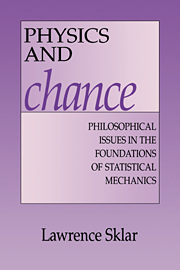Book contents
- Frontmatter
- Contents
- Preface
- 1 Introduction
- 2 Historical sketch
- 3 Probability
- 4 Statistical explanation
- 5 Equilibrium theory
- 6 Describing non-equilibrium
- 7 Rationalizing non-equilibrium theory
- 8 Cosmology and irreversibility
- 9 The reduction of thermodynamics to statistical mechanics
- 10 The direction of time
- 11 The current state of major questions
- References
- Index
4 - Statistical explanation
Published online by Cambridge University Press: 04 December 2009
- Frontmatter
- Contents
- Preface
- 1 Introduction
- 2 Historical sketch
- 3 Probability
- 4 Statistical explanation
- 5 Equilibrium theory
- 6 Describing non-equilibrium
- 7 Rationalizing non-equilibrium theory
- 8 Cosmology and irreversibility
- 9 The reduction of thermodynamics to statistical mechanics
- 10 The direction of time
- 11 The current state of major questions
- References
- Index
Summary
Philosophers on explanation
Causation and the Humean critique
We wish to know not only what happens in the world, but why it happens. We are interested, we say, in explanations of the phenomena of the world. We want explanations of both particular occurrences (“why did this rock dissolve when I placed it in the water?”) and of general kinds of happenings (“why does salt dissolve when placed in water?”). But what is it to give an explanation of a happening or a class of happenings?
Aristotle is famous for offering a first philosophical account of the nature of explanation. It consists, he says, in giving the “causes” of the phenomenon in question. Here, he includes what is called the “efficient cause,” corresponding most closely to our present idea that an event is produced by continuous earlier events that produce the phenomenon. Influenced by his experience in biology, he thinks of all events as governed by function, end, or purpose as well, so that a full account of why they occur must bring out their place in the accomplishment of some end or purpose. That is, a full explanatory account must offer the “final cause” of the phenomenon as well as its proximate efficient cause.
- Type
- Chapter
- Information
- Physics and ChancePhilosophical Issues in the Foundations of Statistical Mechanics, pp. 128 - 155Publisher: Cambridge University PressPrint publication year: 1993



